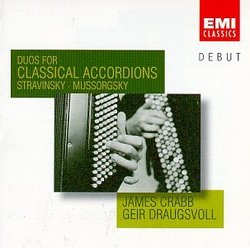| All Artists: Modest Mussorgsky, Igor Stravinsky, James Crabb & Geir Draugsvoll Title: Duos for Classical Accordions Members Wishing: 0 Total Copies: 0 Label: Angel Records Release Date: 6/10/1997 Genres: International Music, Classical Styles: Latin Music, Tango, Ballets & Dances, Ballets, Forms & Genres, Suites, Historical Periods, Modern, 20th, & 21st Century Number of Discs: 1 SwapaCD Credits: 1 UPC: 724356970526 |
Search - Modest Mussorgsky, Igor Stravinsky, James Crabb & Geir Draugsvoll :: Duos for Classical Accordions
 | Modest Mussorgsky, Igor Stravinsky, James Crabb & Geir Draugsvoll Duos for Classical Accordions Genres: International Music, Classical
Petrouchka arranged for two accordions is not unlike the original, since the composer's push-button winds and biting, nasal strings resemble nothing if not a giant orchestral squeeze box. Little is lost in this "de-orch... more » |
Larger Image |

 Track Listings (20) - Disc #1
Track Listings (20) - Disc #1